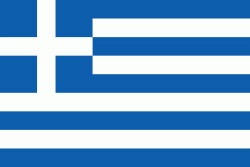Glyfada (Glyfáda)
Glyfada (Γλυφάδα, ) is a town and a suburb in South Athens located in the Athens Riviera along the Athens coast. It is situated in the southern parts of the Athens' Urban Area. The area stretches from the foot of the Hymettus mountain to the Saronic Gulf. It is the largest of Athens' southern suburbs.
In ancient times, the area was a deme known as Aixone (Αἰξωνή). Today, Glyfada is packed with some of the capital's best-known nightclubs, upscale restaurants and shops. It could be argued to be one of the most "Americanized" of Athenian municipalities, since an American airbase was located nearby until the early 1990s. The base's population contributed in part to Glyfada's character, leading to a unique blend of Greek and American atmosphere and cuisine. Although the base is now gone and the school relocated, Glyfada still retains part of its American flavor while continuing to offer distinctly Greek cuisine, entertainment and nightlife.
Glyfada was established as the heart of Athens' southern suburbs, because of its prime waterfront location, rich commercial center, and modern business district. It has been described as the headpoint of the 'Athens Riviera' and features some of Europe's most opulent seafront residences, gardens and extensive beachfront property, with a modern marina.
The town hall is located at the center of the municipality; nearby, Glyfada's shopping district has one of the most vibrant and diversified commercial centers of Athens' neighborhoods, with a collection ranging across specialist and designer boutiques. Its proximity to a succession of Beaches and a concentrated seaside club scene also greatly increases the number of visitors during the summer months. The area's shopping district runs across Metaxa Avenue and Grigoriou Labraki Street while both the offices of major businesses and shopping areas also dot the Avenues Vouliagmenis, Gounari and Gennimata.
At the beginning of the 20th century the town had already changed its name to "Glyfada", a name given because of the presence of salt-water wells typical of this area.
In ancient times, the area was a deme known as Aixone (Αἰξωνή). Today, Glyfada is packed with some of the capital's best-known nightclubs, upscale restaurants and shops. It could be argued to be one of the most "Americanized" of Athenian municipalities, since an American airbase was located nearby until the early 1990s. The base's population contributed in part to Glyfada's character, leading to a unique blend of Greek and American atmosphere and cuisine. Although the base is now gone and the school relocated, Glyfada still retains part of its American flavor while continuing to offer distinctly Greek cuisine, entertainment and nightlife.
Glyfada was established as the heart of Athens' southern suburbs, because of its prime waterfront location, rich commercial center, and modern business district. It has been described as the headpoint of the 'Athens Riviera' and features some of Europe's most opulent seafront residences, gardens and extensive beachfront property, with a modern marina.
The town hall is located at the center of the municipality; nearby, Glyfada's shopping district has one of the most vibrant and diversified commercial centers of Athens' neighborhoods, with a collection ranging across specialist and designer boutiques. Its proximity to a succession of Beaches and a concentrated seaside club scene also greatly increases the number of visitors during the summer months. The area's shopping district runs across Metaxa Avenue and Grigoriou Labraki Street while both the offices of major businesses and shopping areas also dot the Avenues Vouliagmenis, Gounari and Gennimata.
At the beginning of the 20th century the town had already changed its name to "Glyfada", a name given because of the presence of salt-water wells typical of this area.
Map - Glyfada (Glyfáda)
Map
Country - Greece
 |
 |
| Flag of Greece | |
Greece is considered the cradle of Western civilization, being the birthplace of democracy, Western philosophy, Western literature, historiography, political science, major scientific and mathematical principles, theatre and the Olympic Games. From the eighth century BC, the Greeks were organised into various independent city-states, known as poleis (singular polis), which spanned the Mediterranean and the Black Sea. Philip II of Macedon united most of present-day Greece in the fourth century BC, with his son Alexander the Great rapidly conquering much of the ancient world, from the eastern Mediterranean to the North Western parts of India. The subsequent Hellenistic period saw the height of Greek culture and influence in antiquity. Greece was annexed by Rome in the second century BC, becoming an integral part of the Roman Empire and its continuation, the Byzantine Empire, which was culturally and linguistically predominantly Greek.
Currency / Language
| ISO | Currency | Symbol | Significant figures |
|---|---|---|---|
| EUR | Euro | € | 2 |
| ISO | Language |
|---|---|
| EN | English language |
| FR | French language |
| EL | Greek language |















